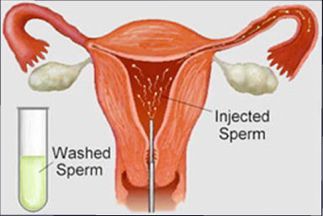Helping You Become a Parent with Intrauterine Insemination
 Intrauterine insemination (IUI), also known as artificial insemination, is a simple and effective technique that can significantly increase the chance of pregnancy. IUI is not considered to be part of ART (Advanced Reproductive Technologies which include IVF, GIFT, ZIFT and more). In fact, IUI is one of the oldest fertility techniques available. While IUI does not convey the same chance for success as IVF, in properly selected patients, it can represent an excellent first line treatment. During an IUI procedure, specifically prepared sperm is deposited directly inside the uterus, close to the location of the egg(s). This is accomplished with the use of a specially designed plastic catheter that is passed through the cervical canal into the uterine cavity. The catheter is attached to a syringe, which is loaded with the desired sperm. Once the catheter is properly positioned, the sperm is injected from the syringe through the catheter and into the uterus. The resulting high concentration of sperm can then fertilize the egg(s) without having to travel through the potentially inhospitable environments of the vagina and cervix.
Intrauterine insemination (IUI), also known as artificial insemination, is a simple and effective technique that can significantly increase the chance of pregnancy. IUI is not considered to be part of ART (Advanced Reproductive Technologies which include IVF, GIFT, ZIFT and more). In fact, IUI is one of the oldest fertility techniques available. While IUI does not convey the same chance for success as IVF, in properly selected patients, it can represent an excellent first line treatment. During an IUI procedure, specifically prepared sperm is deposited directly inside the uterus, close to the location of the egg(s). This is accomplished with the use of a specially designed plastic catheter that is passed through the cervical canal into the uterine cavity. The catheter is attached to a syringe, which is loaded with the desired sperm. Once the catheter is properly positioned, the sperm is injected from the syringe through the catheter and into the uterus. The resulting high concentration of sperm can then fertilize the egg(s) without having to travel through the potentially inhospitable environments of the vagina and cervix.
Additionally, by preparing the sperm prior to insemination, many of the inflammatory factors that are normally present in ejaculated semen are removed. This decreases the risk that an inflammatory reaction within the uterus could affect fertilization or implantation.
Following the IUI, which is performed in our offices, the patient remains in a laying position for about 10 minutes. Depending on the clinical situation, some patients may use supplemental progesterone following the procedure. All patients will check a pregnancy test 14 days after the procedure.
An IUI can be performed in conjunction with natural ovulation or ovulation induced with fertility medications. Further, the sperm source for an IUI can come from a woman’s partner, a known donor, or a sperm bank. Our office can provide information on available sperm banks. Lastly, the timing of an IUI is critical, therefore patients are generally monitored with ultrasounds and blood-work to predict ovulation and determine the best day(s) to perform the procedure.
If you have more questions about IUI or would like to discuss any fertility treatment with one of our specialists, please contact us, we would be happy to speak with you.






